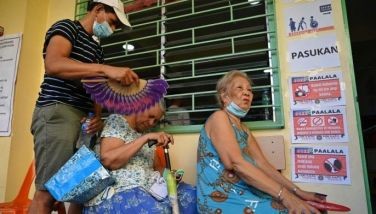Senate votes to terminate VFA
January 20, 2006 | 12:00am
A joint congressional committee has recommended that President Arroyo — a staunch ally of the United States in the war on terrorism — abrogate the RP-US Visiting Forces Agreement (VFA) following the United States’ refusal to hand over to local authorities four US servicemen accused of raping a Filipino woman in Subic Bay last Nov. 1.
Yesterday, the Legislative Oversight Committee on the Visiting Forces Agreement approved a resolution authored by Sen. Miriam Defensor-Santiago calling for the termination of the VFA, a 1999 accord allowing the conduct of large-scale US military exercises in the country.
It also allows American troops charged with crimes to remain in US custody until legal proceedings are completed.
Santiago, who co-chairs the oversight committee with Rep. Jose Cuenco, said abrogating the VFA would allow the government to renegotiate a new bilateral accord with Washington that would give more power to the Philippines to take custody of US soldiers who run afoul of the law.
The resolution would then need to be approved by the Senate and the House of Representatives before it could go to Mrs. Arroyo for her approval or veto.
"It appears that the US government has failed to properly take into account the high level of sensitivity with which the Filipino public views the custody of the US servicemen," the committee said in its resolution.
The resolution also calls for suspending budgets to prevent the Philippine military from holding joint combat and counterterrorism exercises with US forces during the trial of the US marines.
Santiago wants a new defense accord — similar to the agreement that the United States has with Japan and South Korea — that would enable Philippine authorities to retain custody of US military personnel accused of crimes.
"However, the VFA does not contain a provision for revision or renegotiation," Santiago said.
"Even if the Philippines makes a request to the US for the revision or renegotiation of the agreement, the US can easily reject our request because there is no legal provision in the VFA which compels them to do otherwise," she said.
Santiago said the current accord must be terminated "in order to make renegotiation obligatory to the US."
The accord would be considered terminated 180 days after either Manila or Washington sends a written notice to the other of its desire to abrogate the pact.
"The six-month period between the issuance of the termination notice to the US and the complete abrogation of the VFA can be used to renegotiate another agreement," she explained. "The US has no choice but to renegotiate with us if we serve them the notice of termination."
Santiago cited Washington’s so-called "status of forces agreement" with Japan, pointing out how a joint committee overseeing the accord is used as a means of consultation between the US and Japanese governments on all matters requiring mutual consent in the implementation of the pact.
"It is so organized that it can meet immediately at any time at the request of representatives of each parties," Santiago said.
The provisions are also available in the agreement of the US with South Korea.
"These provisions on the creation of the joint committee and on revision are woefully lacking in the VFA," Santiago said. "We cannot countenance the continued existence of an agreement that is patently disadvantageous. We have no choice but to terminate the VFA."
Sen. Manuel Villar, vice chairman of the Senate foreign relations committee, said the "benefits, quantifiable or unquantifiable, that the Philippine military is getting as result of the VFA are not enough to justify its continuation."
"It has no many lopsided provisions that should be renegotiated at the very least. We have only found out about these one-sided or biased provisions because of the Subic rape case," Villar said in a statement sent to the media.
"It’s about time that we show them that the welfare of our citizens is more important to us than any agreements whatsoever. It seems that they are not even taking us seriously."
The US assistance extended to the Philippines because of the VFA "cannot justify the biased or lopsided provisions in it. We should enter agreements like VFAs (as) equals, thus they should be mutually beneficial or favorable," Villar emphasized.
The Department of Foreign Affairs disclosed yesterday it had reiterated its call for the US government to hand over custody of the four marines, despite its earlier refusal to do so.
The department said that, in its latest note verbale, it had cited the alleged rape was an "extraordinary case," adding that there was "patent disparity in the treatment of US military personnel in other countries on the issue of custody in criminal cases."
The DFA also said it wished to continue discussions over the custody of the four Marines.
The rape case is seen as a black mark on US military exercises that had been credited with helping weaken al-Qaeda-linked militants in the southern Philippines.
The four servicemen took part in large-scale military exercises with their Philippine counterparts in the former US naval port of Subic Bay late last year.
They were on shore leave on Nov. 1 when a 22-year-old Filipina accused them of raping her inside a van while she joined the soldiers on a bar-hop.
The soldiers had insisted only one of them had sex with her and that the act was consensual.
Earlier this week, the Philippine government sought custody of the marines, who are being held at the US embassy, after the Olongapo City regional trial court issued warrants for their arrest last week in connection with the alleged rape.
Prosecutors argued that the Philippines should have custody because the alleged crime was committed on Philippine soil.
In seeking the marines’ arrest, Olongapo City Prosecutor Prudencio Jalandoni also cited a 1995 rape case in Okinawa, Japan, in which the United States turned over three US soldiers to Japanese authorities on grounds of "sympathetic considerations."
The three were accused of raping a 12-year-old Japanese girl and were convicted. The case also sparked anti-US protests in Japan, especially on Okinawa, which saw one of the fiercest battles in the last months of World War II.
"We find no reason why the Philippine government could not take custody of the US servicemen in this case," Jalandoni told the court.
Washington formally rejected Manila’s request, invoking the VFA.
However, the US decision infuriated many in the former US colony, including many lawmakers, and set off small but noisy anti-US street protests both in Olongapo and in Manila.
"This is an outrage to our integrity and dignity," said Cuenco, who voted for the congressional resolution.
Villar complained that the US Embassy officials "have not even accorded our government officials importance since they have delegated only their deputies and assistants to deal with our VFA concerns. The rape case in Subic that has invited the outrage of our people is, it seems, the least of their priorities."
"At this point, the compelling factors that may have caused this position is the question of national sovereignty, national dignity and the protection of our citizens," Sen. Rodolfo Biazon, a former Armed Forces chief and chairman of the Senate committee on defense and national security.
Rep. Teofisto Guingona III said the "lopsided agreement… should be negotiated on the principle of reciprocity and equality of national and personal rights."
Guingona’s father, former Vice President Teofisto Guingona Jr., voted against the VFA during his stint as Senate minority leader.
US Embassy spokesman Matt Lussenhop said Washington would continue to cooperate with the Philippines "as the case goes to trial" but added that the VFA had benefits for both countries.
He said the case was still in Philippine jurisdiction as required by the VFA and the US government was fulfilling its obligations by making the four Americans available for any proceedings.
The Olongapo court will take up today a defense motion seeking to quash the arrest warrants on the four marines.
The defense has asked the court to reconsider its decision denying their request for a suspension of the proceedings and a recall of the arrest warrants.
"Apparently, the honorable court denied the motion to suspend proceedings on the ground that there was already a finding of probable cause, therefore the issuance of the warrant of arrest must follow in accordance with the constitutional mandate," the accused said in their motion.
"Although Article III Section 2 of the Constitution in relation to Section 6 rule 112 of the Revised Rules on Criminal Procedure does provide that a warrant of arrest shall issue upon determination of probable cause by the judge, this is not, however, an absolute rule so as not to admit exceptions."
Defense lawyers contended that the "right of the accused will be violated should the proceedings in the instant case be allowed to proceed."
They also cited the VFA’s provisions on criminal jurisdiction, saying that the "custody of US personnel over whom the Philippines is to exercise jurisdiction shall immediately reside with United States military authorities, if they so request."
"By virtue of the abovementioned VFA, no less than the United States government has undertaken such obligation, that is, the taking into custody of their military personnel accused of having committed a crime, and further, making them available to Philippine authorities in time for any investigative or judicial proceedings."
Prosecutors, meanwhile, plan to file a petition asking the court to immediately set the date for arraignment. — With Pia Lee-Brago, Bebot Sison Jr., Jose Rodel Clapano, AP, AFP
Yesterday, the Legislative Oversight Committee on the Visiting Forces Agreement approved a resolution authored by Sen. Miriam Defensor-Santiago calling for the termination of the VFA, a 1999 accord allowing the conduct of large-scale US military exercises in the country.
It also allows American troops charged with crimes to remain in US custody until legal proceedings are completed.
Santiago, who co-chairs the oversight committee with Rep. Jose Cuenco, said abrogating the VFA would allow the government to renegotiate a new bilateral accord with Washington that would give more power to the Philippines to take custody of US soldiers who run afoul of the law.
The resolution would then need to be approved by the Senate and the House of Representatives before it could go to Mrs. Arroyo for her approval or veto.
"It appears that the US government has failed to properly take into account the high level of sensitivity with which the Filipino public views the custody of the US servicemen," the committee said in its resolution.
The resolution also calls for suspending budgets to prevent the Philippine military from holding joint combat and counterterrorism exercises with US forces during the trial of the US marines.
Santiago wants a new defense accord — similar to the agreement that the United States has with Japan and South Korea — that would enable Philippine authorities to retain custody of US military personnel accused of crimes.
"However, the VFA does not contain a provision for revision or renegotiation," Santiago said.
"Even if the Philippines makes a request to the US for the revision or renegotiation of the agreement, the US can easily reject our request because there is no legal provision in the VFA which compels them to do otherwise," she said.
Santiago said the current accord must be terminated "in order to make renegotiation obligatory to the US."
The accord would be considered terminated 180 days after either Manila or Washington sends a written notice to the other of its desire to abrogate the pact.
"The six-month period between the issuance of the termination notice to the US and the complete abrogation of the VFA can be used to renegotiate another agreement," she explained. "The US has no choice but to renegotiate with us if we serve them the notice of termination."
Santiago cited Washington’s so-called "status of forces agreement" with Japan, pointing out how a joint committee overseeing the accord is used as a means of consultation between the US and Japanese governments on all matters requiring mutual consent in the implementation of the pact.
"It is so organized that it can meet immediately at any time at the request of representatives of each parties," Santiago said.
The provisions are also available in the agreement of the US with South Korea.
"These provisions on the creation of the joint committee and on revision are woefully lacking in the VFA," Santiago said. "We cannot countenance the continued existence of an agreement that is patently disadvantageous. We have no choice but to terminate the VFA."
Sen. Manuel Villar, vice chairman of the Senate foreign relations committee, said the "benefits, quantifiable or unquantifiable, that the Philippine military is getting as result of the VFA are not enough to justify its continuation."
"It has no many lopsided provisions that should be renegotiated at the very least. We have only found out about these one-sided or biased provisions because of the Subic rape case," Villar said in a statement sent to the media.
"It’s about time that we show them that the welfare of our citizens is more important to us than any agreements whatsoever. It seems that they are not even taking us seriously."
The US assistance extended to the Philippines because of the VFA "cannot justify the biased or lopsided provisions in it. We should enter agreements like VFAs (as) equals, thus they should be mutually beneficial or favorable," Villar emphasized.
The Department of Foreign Affairs disclosed yesterday it had reiterated its call for the US government to hand over custody of the four marines, despite its earlier refusal to do so.
The department said that, in its latest note verbale, it had cited the alleged rape was an "extraordinary case," adding that there was "patent disparity in the treatment of US military personnel in other countries on the issue of custody in criminal cases."
The DFA also said it wished to continue discussions over the custody of the four Marines.
The four servicemen took part in large-scale military exercises with their Philippine counterparts in the former US naval port of Subic Bay late last year.
They were on shore leave on Nov. 1 when a 22-year-old Filipina accused them of raping her inside a van while she joined the soldiers on a bar-hop.
The soldiers had insisted only one of them had sex with her and that the act was consensual.
Earlier this week, the Philippine government sought custody of the marines, who are being held at the US embassy, after the Olongapo City regional trial court issued warrants for their arrest last week in connection with the alleged rape.
Prosecutors argued that the Philippines should have custody because the alleged crime was committed on Philippine soil.
In seeking the marines’ arrest, Olongapo City Prosecutor Prudencio Jalandoni also cited a 1995 rape case in Okinawa, Japan, in which the United States turned over three US soldiers to Japanese authorities on grounds of "sympathetic considerations."
The three were accused of raping a 12-year-old Japanese girl and were convicted. The case also sparked anti-US protests in Japan, especially on Okinawa, which saw one of the fiercest battles in the last months of World War II.
"We find no reason why the Philippine government could not take custody of the US servicemen in this case," Jalandoni told the court.
Washington formally rejected Manila’s request, invoking the VFA.
However, the US decision infuriated many in the former US colony, including many lawmakers, and set off small but noisy anti-US street protests both in Olongapo and in Manila.
"This is an outrage to our integrity and dignity," said Cuenco, who voted for the congressional resolution.
Villar complained that the US Embassy officials "have not even accorded our government officials importance since they have delegated only their deputies and assistants to deal with our VFA concerns. The rape case in Subic that has invited the outrage of our people is, it seems, the least of their priorities."
"At this point, the compelling factors that may have caused this position is the question of national sovereignty, national dignity and the protection of our citizens," Sen. Rodolfo Biazon, a former Armed Forces chief and chairman of the Senate committee on defense and national security.
Rep. Teofisto Guingona III said the "lopsided agreement… should be negotiated on the principle of reciprocity and equality of national and personal rights."
Guingona’s father, former Vice President Teofisto Guingona Jr., voted against the VFA during his stint as Senate minority leader.
US Embassy spokesman Matt Lussenhop said Washington would continue to cooperate with the Philippines "as the case goes to trial" but added that the VFA had benefits for both countries.
He said the case was still in Philippine jurisdiction as required by the VFA and the US government was fulfilling its obligations by making the four Americans available for any proceedings.
The Olongapo court will take up today a defense motion seeking to quash the arrest warrants on the four marines.
The defense has asked the court to reconsider its decision denying their request for a suspension of the proceedings and a recall of the arrest warrants.
"Apparently, the honorable court denied the motion to suspend proceedings on the ground that there was already a finding of probable cause, therefore the issuance of the warrant of arrest must follow in accordance with the constitutional mandate," the accused said in their motion.
"Although Article III Section 2 of the Constitution in relation to Section 6 rule 112 of the Revised Rules on Criminal Procedure does provide that a warrant of arrest shall issue upon determination of probable cause by the judge, this is not, however, an absolute rule so as not to admit exceptions."
Defense lawyers contended that the "right of the accused will be violated should the proceedings in the instant case be allowed to proceed."
They also cited the VFA’s provisions on criminal jurisdiction, saying that the "custody of US personnel over whom the Philippines is to exercise jurisdiction shall immediately reside with United States military authorities, if they so request."
"By virtue of the abovementioned VFA, no less than the United States government has undertaken such obligation, that is, the taking into custody of their military personnel accused of having committed a crime, and further, making them available to Philippine authorities in time for any investigative or judicial proceedings."
Prosecutors, meanwhile, plan to file a petition asking the court to immediately set the date for arraignment. — With Pia Lee-Brago, Bebot Sison Jr., Jose Rodel Clapano, AP, AFP
BrandSpace Articles
<
>
- Latest
- Trending
Trending
Latest
Trending
Latest
Recommended
































